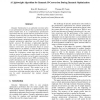Free Online Productivity Tools
i2Speak
i2Symbol
i2OCR
iTex2Img
iWeb2Print
iWeb2Shot
i2Type
iPdf2Split
iPdf2Merge
i2Bopomofo
i2Arabic
i2Style
i2Image
i2PDF
iLatex2Rtf
Sci2ools
129
click to vote
IEEEPACT
2000
IEEE
2000
IEEE
A Lightweight Algorithm for Dynamic If-Conversion during Dynamic Optimization
Dynamic Optimization is an umbrella term that refers to any optimization of software that is performed after the initial compile time. It is a complementary optimization opportunity that may greatly improve performance on any computer system, but plays an especially important role in statically scheduled code. Several groups are working on developing dynamic optimization systems, yet the area of dynamic optimization algorithms can still benefit from further research. We introduce a lightweight algorithm that can be used in any modern dynamic optimizer to balance control flow and predication based on actual runtime behavior. In addition, we study the effectiveness of predicting overall runtime behavior based on a small sample size. Preliminary results show that if we skip the warm-up period of programs, profiles based on a small sample size of a particular run can be quite representative of overall runtime behavior (up to 98% correlation). This profile information can be used effective...
Distributed And Parallel Computing | Dynamic Optimizations | IEEEPACT 2000 | Modern Dynamic Optimizers | Runtime Behavior |
Related Content
| Added | 31 Jul 2010 |
| Updated | 31 Jul 2010 |
| Type | Conference |
| Year | 2000 |
| Where | IEEEPACT |
| Authors | Kim M. Hazelwood, Thomas M. Conte |
Comments (0)

